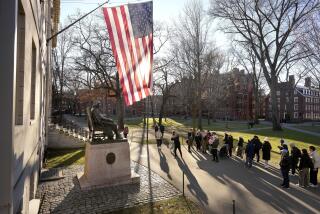On race, Harvard still must learn
- Share via
President Obama’s White House beer with Harvard professor Henry Louis Gates Jr. and Cambridge police Sgt. James Crowley was good for garnering headlines. But let’s have no expectations about its worth or reach as a “teachable moment” when it comes to complicated social issues. Why? Because Gates appears to be a product of his institution and, like Harvard professors who preceded him, mired in the past and unwilling to move beyond his assumptions. I believe I can make the comparison. My family played a pivotal role in race issues at Harvard.
My father, Lucien Alexis Jr. (Harvard 1942) helped spark the great race awakening at Harvard when he and fellow members of the Harvard lacrosse team arrived for a match at the Naval Academy at Annapolis in 1941. The academy insisted that my father, the only black team member, be removed, declaring that no midshipman would take the field with a colored man.
Tempers boiled, and the Harvard lacrosse team prepared to forfeit the game. William J. Bingham, the university’s athletic director, intervened, ordering Harvard’s coach to send my father back to Cambridge. Harvard played the scheduled match.
Almost 70 years later, it’s clear that the Harvard-Navy lacrosse game of 1941 offered a near-perfect teachable moment for the cause of equality (a cause Harvard claimed to espouse) had the school so chosen. Early on, Harvard could have shattered the grip of racial hatred by standing firm. But Harvard didn’t seize the moment. Instead, it chose the easy path.
To save the Harvard lacrosse coach and team members the embarrassment of asking him to leave, my father, quietly, caught the night train back to Cambridge, telling the team it was his idea.
George Hanford, Harvard’s All-American goalie and son of a Harvard dean, knew that something awful had occurred. “I get tears in my eyes when I think about it,” he said. Navy went on to clobber Harvard, 12-0.
Word of the Annapolis happenings spread, and the student newspaper, the Harvard Crimson, championed my father, heaping scorn on the Naval Academy and Harvard: “Those officials here who asked the negro to return to college should explain the reasons for their actions,” went one article, “by which Harvard has kow-towed to Jim-Crowism. Navy bigwigs should also be taught that when this country, this college and the navy itself declare their faith in democratic equality, they mean to practice what they preach.”
Boston newspapers soon joined in on the side of equality; the Senate Committee on Naval Affairs called for investigations; and another Harvard graduate, President Franklin Roosevelt, was asked to get involved. Yet, even then, Harvard didn’t transcend the times -- a memo has survived from an unknown administrator declaring that Bingham had made “the right decision in withdrawing the boy, rather than telling the entire Navy and the entire south to go to Hell on an insoluble matter of prejudice.”
Harvard’s leaders, in 1941, were not ready to see the future. Nor are they today. From his statements in the days after his arrest, Gates seems locked in the past regarding race. His first reaction was to demand preferential treatment, see himself as a victim and see his arrest as “the way a black man is treated in America.” The message he has sent is that what happened to him was purely about race, when we’re far beyond that.
If he looked around, he would discover that black men and women can and do compete equally at Harvard, and need no special protection, class or distinction. They achieve using intellect, hard work and perseverance. The world Gates inhabits, which prefers victimization and demands special treatment, is as wrong today as Harvard’s Jim Crowism was in 1941.
Obama’s “teachable moment” could have done the nation a great service by denouncing race-based distinctions of any sort. After all, he wasn’t elected because he’s black, but because Americans thought he had the wisdom, temperament and ability to serve as president. Yet neither the president nor the professor has seized the moment to take bolder steps in a discourse on race.
Still, just as in 1941, I suspect those bolder steps are inevitable. In my father’s time, students, not faculty or senior leaders, rose up to confront injustice. A week after the ill-fated match with Navy, the Harvard lacrosse team played Army at West Point. This time, my father played. A cordon of West Point cadets, led by black cadets accepted to West Point, welcomed the team. My dad never forgot the thrill as they cheered like banshees.
That was only the beginning. My dad died too early to see the deepest changes his story prefigured. Nor did he live to see the day I married a West Point graduate. Funny, isn’t it, how history works?


